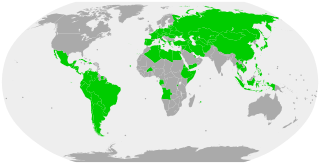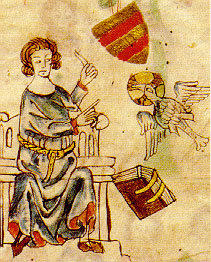
The Peace of Westphalia is the collective name for two peace treaties signed in October 1648 in the Westphalian cities of Osnabrück and Münster. They ended the Thirty Years' War (1618–1648) and brought peace to the Holy Roman Empire, closing a calamitous period of European history that killed approximately eight million people. Holy Roman Emperor Ferdinand III, the kingdoms of France and Sweden, and their respective allies among the princes of the Holy Roman Empire, participated in the treaties.

The Napoleonic Code, officially the Civil Code of the French, is the French civil code established during the French Consulate period in 1804 and still in force, although frequently amended since.

An armistice is a formal agreement of warring parties to stop fighting. It is not necessarily the end of a war, as it may constitute only a cessation of hostilities while an attempt is made to negotiate a lasting peace. It is derived from the Latin arma, meaning "arms" and -stitium, meaning "a stopping".

The law of war is the component of international law that regulates the conditions for initiating war and the conduct of hostilities. Laws of war define sovereignty and nationhood, states and territories, occupation, and other critical terms of law.

An arrest is the act of apprehending and taking a person into custody, usually because the person has been suspected of or observed committing a crime. After being taken into custody, the person can be questioned further and/or charged. An arrest is a procedure in a criminal justice system, sometimes it is also done after a court warrant for the arrest.

The Schengen Agreement is a treaty which led to the creation of Europe's Schengen Area, in which internal border checks have largely been abolished. It was signed on 14 June 1985, near the town of Schengen, Luxembourg, by five of the ten member states of the then European Economic Community. It proposed measures intended to gradually abolish border checks at the signatories' common borders, including reduced-speed vehicle checks which allowed vehicles to cross borders without stopping, allowing residents in border areas freedom to cross borders away from fixed checkpoints, and the harmonisation of visa policies.

A civil code is a codification of private law relating to property, family, and obligations.

Legal history or the history of law is the study of how law has evolved and why it has changed. Legal history is closely connected to the development of civilisations and operates in the wider context of social history. Certain jurists and historians of legal process have seen legal history as the recording of the evolution of laws and the technical explanation of how these laws have evolved with the view of better understanding the origins of various legal concepts; some consider legal history a branch of intellectual history. Twentieth-century historians viewed legal history in a more contextualised manner – more in line with the thinking of social historians. They have looked at legal institutions as complex systems of rules, players and symbols and have seen these elements interact with society to change, adapt, resist or promote certain aspects of civil society. Such legal historians have tended to analyse case histories from the parameters of social-science inquiry, using statistical methods, analysing class distinctions among litigants, petitioners and other players in various legal processes. By analyzing case outcomes, transaction costs, and numbers of settled cases, they have begun an analysis of legal institutions, practices, procedures and briefs that gives a more complex picture of law and society than the study of jurisprudence, case law and civil codes can achieve.

The Hague Conventions of 1899 and 1907 are a series of international treaties and declarations negotiated at two international peace conferences at The Hague in the Netherlands. Along with the Geneva Conventions, the Hague Conventions were among the first formal statements of the laws of war and war crimes in the body of secular international law. A third conference was planned for 1914 and later rescheduled for 1915, but it did not take place because of the start of World War I.
The Bürgerliches Gesetzbuch, abbreviated BGB, is the civil code of Germany, codifying most generally-applicably private law. In development since 1881, it became effective on 1 January 1900, and was considered a massive and groundbreaking project.

Civil law is a legal system originating in Italy and France and adopted in much of the world. The civil law system is intellectualized within the framework of Roman law and French civil law, and with core principles codified into a referable system, which serves as the primary source of law. The civil law system is often contrasted with the common law system, which originated in medieval England. Whereas the civil law takes the form of legal codes, the law in common law systems historically came from uncodified case law that arose as a result of judicial decisions, recognising prior court decisions as legally binding precedent.

The Swiss Civil Code is a portion of the second part of the internal Swiss law that regulates the codified law ruling in Switzerland and relationship between individuals. It was first adopted in 1907.

The Sachsenspiegel is one of the most important law books and custumals compiled during the Holy Roman Empire. Originating between 1220 and 1235 as a record of existing local traditional customary laws and rulings, it was used in places until as late as 1900. Some legal principles as captured in the book reign into recent time laws throughout Europe. It is important not only for its lasting effect on later German and Dutch law but also as an early example of written prose in a German language. The Sachsenspiegel is the first comprehensive law book not in Latin, but in Middle Low German. A Latin edition is known to have existed, but only fragmented chapters remain.

Eike of Repgow was a medieval German administrator who compiled the Sachsenspiegel code of law in the 13th century.

The Pleading in English Act 1362, often rendered Statute of Pleading, was an Act of the Parliament of England. The Act complained that because the Norman French language was largely unknown to the common people of England, they had no knowledge of what was being said for or against them in the courts, which used Law French. The Act therefore stipulated that "all Pleas which shall be pleaded in [any] Courts whatsoever, before any of his Justices whatsoever, or in his other Places, or before any of His other Ministers whatsoever, or in the Courts and Places of any other Lords whatsoever within the Realm, shall be pleaded, shewed, defended, answered, debated, and judged in the English language, and that they be entered and inrolled in Latin".

Łaski's Statute(s), of 1505, was the first codification of law published in the Kingdom of Poland. The printing in 1506 was the first illustrated printing in Poland.
The use of flags, emblems and anthems of Nazi Germany (1933–1945) is currently subject to legal restrictions in a number of countries, such as Austria, Brazil, Czech Republic, France, Germany, Hungary, Israel, Poland, Russia, Ukraine and other countries.
The rule according to a higher law is a statement which expresses that no law may be enforced by the government unless it conforms with certain universal principles of fairness, morality, and justice. Thus, the rule according to a higher law may serve as a practical legal criterion to qualify the instances of political or economical decision-making, when a government, even though acting in conformity with clearly defined and properly enacted law, still produces results which many observers find unfair or unjust.
The principle of legality in criminal law was developed in the eighteenth century by the Italian criminal lawyer Cesare Beccaria and holds that no one can be convicted of a crime without a previously published legal text which clearly describes the crime. This principle is accepted and codified in modern democratic states as a basic requirement of the rule of law. It has been described as "one of the most 'widely held value-judgement[s] in the entire history of human thought ' ".
Monastery death was a form of civil death – the loss of legal capacity of living persons – known to common and civil law. The monastery death happened in some jurisdictions when a person entered a monastery or nunnery and professed into consecrated life. Upon entering the religious order, the person was considered dead in private law. Either their normal heirs or the monastery or nunnery inherited all of their possessions.
















